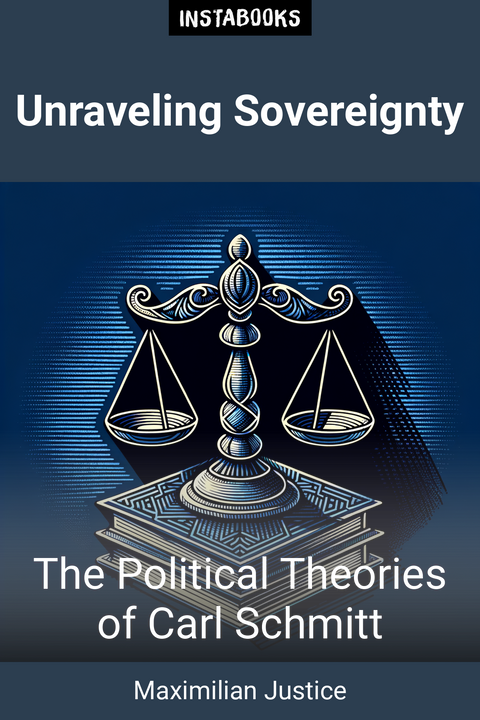
Unraveling Sovereignty
The Political Theories of Carl Schmitt
Included:
✓ 200+ Page AI-Generated Book
✓ ePub eBook File — read on Kindle & Apple Books
✓ PDF Print File (Easy Printing)
✓ Word DOCX File (Easy Editing)
✓ Hi-Res Print-Ready Book Cover (No Logo Watermark)
✓ Full Commercial Use Rights — keep 100% of royalties
✓ Publish under your own Author Name
✓ Sell on Amazon KDP, IngramSpark, Lulu, Blurb & Gumroad to millions of readers worldwide
Introduction to Carl Schmitt's Political Theories
In a world where political ideologies shape our very existence, the thought of Carl Schmitt emerges as a compelling force. This book delves into Schmitt's groundbreaking theories on sovereignty, the state of exception, and the intricate web of modern political thought that he influenced. Schmitt's assertion that politics is rooted in the friend-enemy distinction provokes profound questions about governance and the nature of power.
The Concept of Sovereignty
Schmitt's definition of sovereignty as the power to decide on the state of exception challenges our understanding of legal frameworks and emergency governance. By examining how he articulates the role of the executive in suspending legal norms during crises, readers will grasp the implications of his work on contemporary politics. We analyze his critique of parliamentary democracy and how his ideas relate to current global political trends.
The State of Exception as a Test of Power
Moreover, Schmitt's state of exception becomes a pivotal focus in understanding political authority. By dissecting this concept, we uncover the dynamics of political power during extraordinary circumstances. Are modern governments employing Schmitt’s notion to manage crises such as the COVID-19 pandemic? This book provides critical insights into how Schmitt’s theories are reflected in today’s governance strategies.
Schmitt’s Influence on Modern Thought
In this comprehensive exploration, we further highlight Schmitt's influence on modern political theory and the ongoing debates surrounding his legacy. Various interpretations, including criticism from thinkers like Giorgio Agamben, reveal the contentious nature of his ideas. Through extensive research and analysis, this book contextualizes Schmitt’s contributions within the broader spectrum of political theory.
Conclusion: Relevance Today
As this book concludes, we invite readers to reflect on how Carl Schmitt's political theories resonate in today's tumultuous political arena. The lessons we learn from his work illuminate ongoing challenges in sovereignty, governance, and the role of the state in times of exception. A must-read for political theorists, legal scholars, and anyone interested in the dark yet illuminating world of political thought.
Table of Contents
1. The Man Behind the Theories- Early Life and Education
- Career and Political Affiliations
- Impact of Personal History on Thought
2. Understanding the Concept of the Political
- Friend-Enemy Distinction
- Political Identity and Community
- Challenges to Political Consensus
3. Defining Sovereignty
- The Power to Decide
- Legal Boundaries and Sovereign Authority
- Critiques of Traditional Legalism
4. The State of Exception
- Historical Context and Origins
- Modern Applications and Misuses
- Schmitt’s Theoretical Framework
5. Critique of Parliamentary Democracy
- Schmitt's View on Democracy's Limitations
- Arguments Against Parliamentary Systems
- Relevance in Contemporary Governance
6. Political Theology Revisited
- Defining Political Theology
- Sovereignty and Theology's Interplay
- Schmitt's Lasting Influence on Theology
7. Modern Political Thought through Schmitt's Lens
- Influence on Contemporary Political Theorists
- Schmitt's Reception in Academia
- Debates over His Legacy
8. Sovereignty and the State of Exception Today
- Application during Crises
- Insights from Recent Events
- The Future of Governance and Theory
9. The Dichotomy of Order and Chaos
- Political Stability versus Threat
- The Role of the State in Crisis
- Schmitt’s Perspective on Disorder
10. Comparative Analysis with Other Theorists
- Contrasting with Hannah Arendt
- Comparisons with Giorgio Agamben
- Synthesis of Theoretical Perspectives
11. Lessons from Schmitt for Today's Politics
- Urgency of Sovereign Power
- The Political Landscape in Modern Contexts
- Future Directions in Political Theory
12. Final Reflections on Carl Schmitt
- The Controversial Nature of Schmitt's Theories
- A Call to Further Exploration
- Implications for Future Political Thought
Target Audience
This book is intended for students, scholars, and enthusiasts of political theory, legal philosophy, and history, offering insights into one of the 20th century's most provocative thinkers.
Key Takeaways
- Understanding Carl Schmitt's concept of the political and its implications for governance.
- Insights into Schmitt's views on sovereignty and the state of exception.
- An exploration of the critiques surrounding Schmitt's legacy and their relevance today.
- Examining the intersection of political theory with contemporary issues.
- Recognizing the historical context of Schmitt’s ideas and their application in modern political scenarios.
